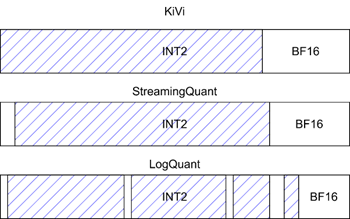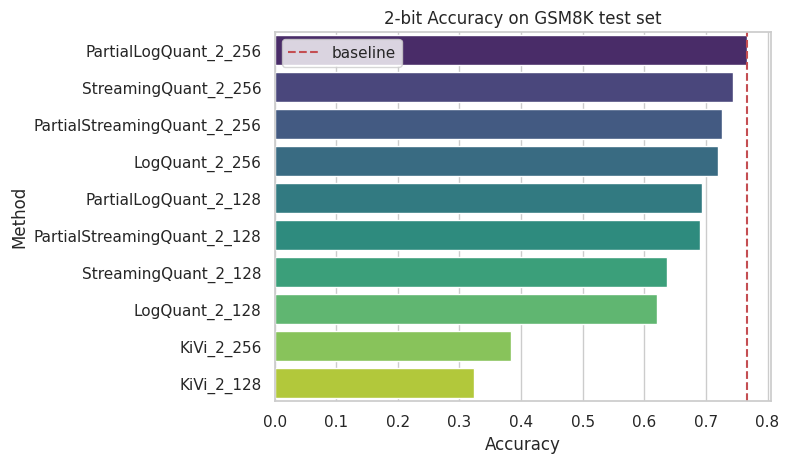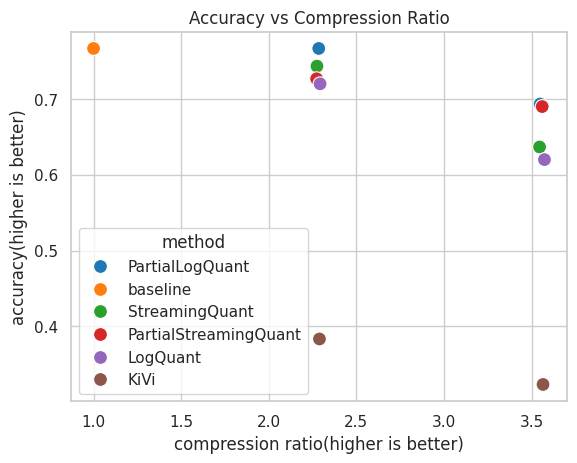LogQuantKV, a high precision 2-bit Quantization method.
sparse attention + quantization
- first 300 questions of GSM8K: test with llama3-8B-Instruct
- Method_<n-bit>_<full precision length>
- torch>=2.3
- transformers>=4.42
- quanto==0.2.0
pip install -U transformers quanto==0.2.0- StreamingQuant: total full precision tokens memory cost will be [sink + 2*window_length]
- LogQuant: total full precision tokens memory cost will be [3*window_length]
- PartialStreamingQuant: total full precision tokens memory cost will be [sink + 1.5*window_length]
- PartialLogQuant: total full precision tokens memory cost will be [2*window_length]
- example of StreamingQuant
import torch
from transformers import AutoModelForCausalLM, AutoTokenizer
from src.LogQuant import QuantoStreamingQuantizedCache, StreamingQuantizedCacheConfig
device = "cuda:0" if torch.cuda.is_available() else "cpu"
model_name = "Qwen/Qwen1.5-7B-Chat"
model = AutoModelForCausalLM.from_pretrained(
model_name,
torch_dtype="auto",
device_map=device,
)
tokenizer = AutoTokenizer.from_pretrained(model_name)
config = StreamingQuantizedCacheConfig(
backend="quanto",
nbits=2,
window_length=8,
sink_length=4,
compute_dtype="auto",
device=device,
)
cache = QuantoStreamingQuantizedCache(config)
messages = [
{
"role": "system",
"content": "You are a helpful assistant."
},
{
"role": "user",
"content": "如果把脏话都说出来了,那么嘴是不是就干净了"
}]
prompt = tokenizer.apply_chat_template(messages, tokenize=False, add_generation_prompt=True)
input_ids = tokenizer(prompt, return_tensors="pt").input_ids.to(device)
output = model.generate(input_ids, max_new_tokens=128, past_key_values=cache)
print(tokenizer.decode(output[0], skip_special_tokens=True))
'''
system
You are a helpful assistant.
user
如果把脏话都说出来了,那么嘴是不是就干净了
assistant
把脏话或不文明的语言说出口,并不能真正使嘴巴“干净”,反而可能会带来更负面的影响。语言是表达**和情感的工具,应该尊重并用得当。即使在某些情况下我们可能无意中说出脏话,但真正的“干净”在于我们的言行是否得体,是否尊重他人,是否能传达积极的信息。
真正的“干净”是内心的修养和道德素质的体现,而不是通过粗俗的言辞来掩饰。我们应该努力培养良好的语言习惯,用积极、礼貌的语言与人交流,这样才能真正体现出我们的素质和教养。
'''- example of LogQuant
import torch
from transformers import AutoModelForCausalLM, AutoTokenizer
from src.LogQuant import QuantoLogQuantizedCache, LogQuantizedCacheConfig
device = "cuda:0" if torch.cuda.is_available() else "cpu"
model_name = "Qwen/Qwen1.5-7B-Chat"
model = AutoModelForCausalLM.from_pretrained(
model_name,
torch_dtype="auto",
device_map=device,
)
tokenizer = AutoTokenizer.from_pretrained(model_name)
config = LogQuantizedCacheConfig(
backend="quanto",
nbits=2,
window_length=4,
compute_dtype="auto",
device=device,
)
cache = QuantoLogQuantizedCache(config)
messages = [
{
"role": "system",
"content": "You are a helpful assistant."
},
{
"role": "user",
"content": "如果把脏话都说出来了,那么嘴是不是就干净了"
}]
prompt = tokenizer.apply_chat_template(messages, tokenize=False, add_generation_prompt=True)
input_ids = tokenizer(prompt, return_tensors="pt").input_ids.to(device)
output = model.generate(input_ids, max_new_tokens=128, past_key_values=cache)
print(tokenizer.decode(output[0], skip_special_tokens=True))
'''
system
You are a helpful assistant.
user
如果把脏话都说出来了,那么嘴是不是就干净了
assistant
不,把脏话或不尊重的语言说出口并不会让嘴巴变得干净。恰恰相反,这通常会显示出粗俗、不礼貌或者情绪失控。真正的“干净”是通过言语和行为展现出尊重、理解、宽容和礼貌。即使在压力或冲突的情况下,我们也应该努力控制自己的言辞,用更建设性的方式表达我们的想法。
'''

